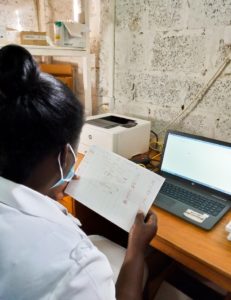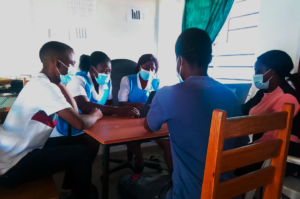
Nancy Mwelwa, a nurse at Ellensdale Health Post in Chongwe, Lusaka Province.
“Computers are very strict; if you enter anything incorrectly, your inputs will be rejected,” says Nancy Mwelwa, a nurse and eLMIS user at Ellensdale Health Post in Chongwe, Lusaka Province.
The majority of health posts are located in remote areas, which poses a number of challenges in terms of medical supply. The electronic logistics management information system (eLMIS) automated the health logistics system, allowing for a more streamlined, efficient supply chain, but users’ lack of technical know-how can sometimes be a major roadblock.
“At our health post, we only have three employees: myself, the facility in-charge, and a volunteer.” “Because we are understaffed, we have to work in all departments interchangeably,” Nancy explains. “this leaves very little time to attend to our pharmaceutical reporting needs.”
Nancy describes the challenges they face when they have clients who need services but must also meet deadlines to re-order medical products. “We frequently found ourselves submitting reports late. We welcomed the eLMIS with open arms because we desperately needed the automated process to help us manage and reorder our products, but we hadn’t fully grasped how to use it.”
Nancy had to go on maternity leave soon after the orientation, and the other pharmacy staff member who had been trained in eLMIS was transferred to another facility. “When I returned, we had a huge backlog that made it impossible for us to use the system,” Nancy says. “We frequently received calls from the eLMIS call centre asking why we hadn’t been able to submit our reports.” This became aggravating because the team had to transport reports to the district, which was difficult due to the health post’s remote location.
Nancy’s request for more orientation was logged in through communication with the US Agency for International Development (USAID) and the US President’s Emergency Plan for AIDS Relief-funded Electronic Supply Chain Management Information System (eSCMIS) Project support team. The team then advised Ellensdale Health Post to collaborate with the nearby Ngwerere Health Post to gain more on-the-job training.
“The eLMIS lead who was providing technical support at our facility mentioned that Ellensdale was having reporting issues, which piqued our interest because Ellensdale is our neighbouring facility,” says Glenda Phiri, facility in-charge for Ngwerere Health Post. “She mentioned that Ellensdale had already been deployed to and oriented with the system, but they were still having issues with it. We volunteered to go to the facility and conduct an eLMIS refresher course due to that conversation.”

Ngwerere Health Post team conducting eLMIS training at neighbouring Ellensdale Health Post
Glenda and two Clinton Health Access Initiative facility volunteers went to Ellensdale Health Post that same week. “We were warmly welcomed,” Glenda says, “and the Ellensdale team had already prepared a site for us to conduct the training.” We began by ensuring that the computers were installed in the correct locations throughout the facility, such as at the ART and pharmacy points. We then continued with the orientation by sampling a variety of fast-moving goods in the system so that the Ellensdale team could get a feel for managing a diverse range of products in eLMIS.” The training went well, and the three Ellensdale employees gained confidence in the system’s practical application. “The following Monday, I received a call from Nancy, asking for clarification on a specific product she was trying to enter, and it made me happy to see they were now using the system frequently,” recalls Glenda.
“I’ve noticed a difference in how we work,” Nancy, the Ellensdale Health Post nurse, says. “Practice makes perfect, so we make it a point to interact with the system regularly, and we’ve been able to manage our products efficiently, including sending in reports without putting the workload on the DHO. Previously, we had to wait for someone to travel to or from the DHO to assist us in submitting our reports and requisitions, which caused commodity resupply to be disrupted on a regular basis. Ngwerere’s orientation was extremely beneficial to us, and we are grateful they were able to assist us.”
The USAID eSCMIS project is responsible for the implementation and sustainability of the eLMIS. A key component of this has been training MOH workers at various levels of the supply chain on how to deploy, orient, support, and provide technical assistance on the system, allowing them to take full ownership of its management. The project has strongly encouraged and empowered facilities with staff who have demonstrated a strong aptitude for eLMIS to conduct orientation and refresher courses for nearby facilities in need. This is the case for the health posts in Ellensdale and Ngwerere. The project envisions processes that will enable the MOH to assume responsibility for the system across the country, with staff stationed across the country’s 10 provinces who can effectively implement and provide technical support at facilities; this network of MOH staff skilled in eLMIS continues to grow since the eLMIS was introduced.
